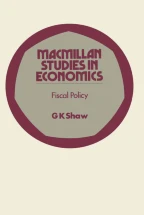
The modern theory of fiscal policy is first and foremost a product of Keynesian economics, and its changing status is intimately linked with the intellectual upheaval which accompanied the Keynesian revolution and the latter-day reappraisals of the economics of Keynes [40, 46]. Keynesian analysis had sanctioned and made respectable the claims of deficit finance in the interests of employment creation. Prior to this, the prevailing orthodoxy, at least in official circles, was to belittle the attempt of government to stimulate the economy by arguing that public expenditures must be at the expense of private, so that no net benefit could be expected — particularly since the latter were on balance considered more efficient. The Keynesian message, that the volume of employment rested upon the level of aggregate demand, and that the latter could be manipulated by appropriate government tax and expenditure policies, heralds the dominance of fiscal policy, and with it the temporary demise of the quantity theory of money.
This is a preview of subscription content, log in via an institution to check access.